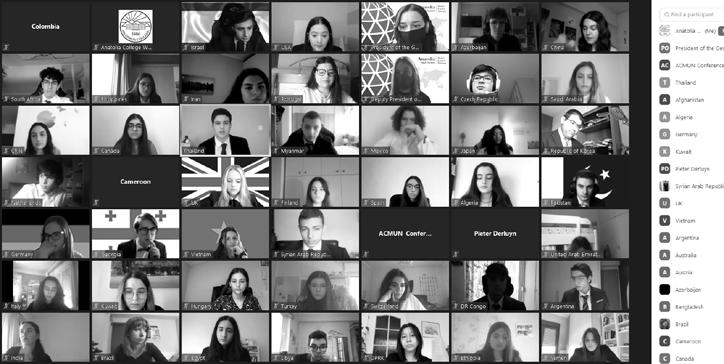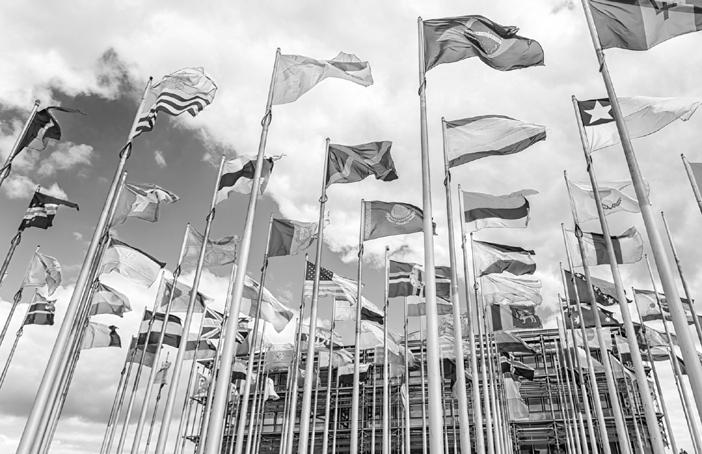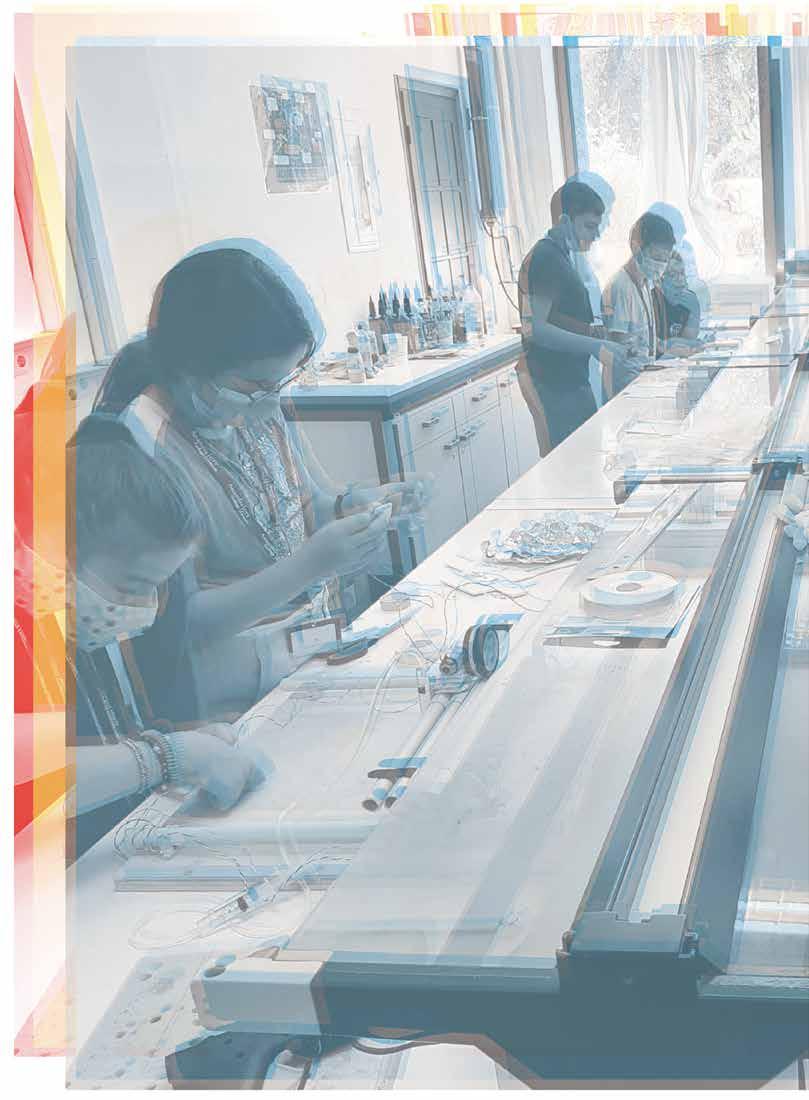
6 minute read
Innovation
IN NOVA TION
FOSTERING INNOVATION IN THE CLASSROOM
Advertisement
pedag -ogy:
Our teaching staff has embraced innovation at all levels, beginning with our youngest students. Since 2013, STEM activities have been featured throughout the Kindergarten curriculum in various formats and events including, introductory science and laboratory visits and the newly introduced STE(A)M Explorers program. This year, kindergarteners and their parents met online to enjoy the annual Kindergarten STEM Family Day, performing experiments with simple materials to see how scientific principles are applied in everyday life.
For our 4th and 5th graders, Anatolia Elementary School has implemented “WiE STARS,” a new STEM Action from the Institute of Electrical and Electronics Engineers (IEEE) that features a series of hands-on workshops and activities. AES is the first primary school in Greece to participate in this pioneering IEEE-led Student-Teacher and Research Engineer/Scientist (STAR) Program.
During a week of volunteer work with the Northern Aegean Dolphin Project at the National Marine Park on the island of Alonissos, a large group of HS students studied dolphin behavior, performed beach clean-ups, and analyzed their findings on plastic and microplastics pollution in the Anatolia College science labs.
CTY Greece faculty participated in the development of a free online platform that helps teachers support gifted students in the classroom environment. The “E-Gift” (www.highability.eu) platform provides educators with tools, materials, and methods to work with exceptional students in the classroom context. Along with targeting talented youth, particular emphasis is placed on helping faculty identify, approach, and support students who are academically challenged, at-risk, low-performing, or from minority communities.
The Northern Aegean Dolphin Project

At the university level, ACT has implemented or planned new partnerships and programs, building its reputation as an innovative regional higher-education institution. In the Science and Technology Division, new courses are being offered on AI, Machine Learning and Big Data. In the Humanities Division, an exciting new collaboration with the Sant’Anna Institute of Sorrento, (Italy) offers a one-year joint program exploring the foundations of Western Civilization. In the Fall of 2022, ACT will launch a four-year BS program in Biological Sciences, building upon 15-years of developing and delivering STEM curriculum in collaboration with leading institutions such as Northeastern University and Washington University. Anatolia’s Lifelong Learning Center (LLC) has emerged as a learning, reskilling and upskilling hub for professionals who wish to advance their careers or pursue opportunities for self-improvement. Focusing on customized learning-as-a-service, the LLC has partnered with Deloitte and TechSaloniki, to jointly offer programs which also include train-to-hire opportunities. Since its inception, the Center has offered a total of 32 programs, totaling 528 participants. To date, a total of 49 companies have funded their employees’ professional skill upgrading.
IMPLEMENTING INNOVATION IN OUR PROGRAMS
technol -ogy:
The pandemic highlighted the need for new, hybrid environments for educational institutions. Anatolia College invested deeply in technology and training to ensure the seamless delivery of all our teaching, activities and services in the event that the school cannot operate in person. Our upgraded approach now incorporates hybrid environments beyond the classroom, including online sessions for clubs, parent-teacher meetings, and remote work options for staff. Online learning poses acute challenges for STEM subjects, which rely on teachers’ and students’ participation in laboratory experiments and demonstrations. As a regional leader in developing and delivering STEM curricula, Anatolia has made the online adaptation of these lessons a priority across the board.
For our elementary students, online meetings helped them to conduct experiments in their homes with everyday ingredients. A challenging aspect of online learning is the evaluation process of student work, so Anatolia’s teachers embraced new tools to help their students complete and submit assignments and tests. These apps are not only effective for teachers, but also highly engaging for our students.
Beyond coursework, Anatolia harnessed technology to keep our extracurricular program running smoothly. Anatolia has a club for just about every interest and talent, and our students derive great benefits from their participation. More than 45 extracurricular groups operated online in the after-school hours. Six hundred High School (grades 7-12) and IBDP students participated in the activities, which were conducted under the supervision of 49 teachers, seven administrative staff, two retired College professors, and three graduates close to the school. Finally, 19 students from the IBDP and the Lyceum classes took on the role of “counselor” to help the younger students.

From gardening to recycling to chess, our students stayed dedicated to their hobbies and passions. Notable highlights were the Junior Drama Club’s online performance of playwright Lindsay Price’s “Scenes from a Quarantine”, and the online production of the Manhattan Theater Club “The Dramatics.” Finally, significant events such as ACMUN (Anatolia College Model United Nations), and ACSTAC (Anatolia College Science & Technology Annual Conference), attracted hundreds of students.
Another noteworthy initiative was the modernization of Anatolia Elementary School’s wonderful library. Since the AES library has continued to grow in volume and use, a new project was implemented to create an electronic archive and catalog. 1,514 books were photographed and divided into nine content-based subject categories. In addition, a new procedure and files were created to manage the borrowing and lending procedures, with guidelines for acquiring new books to increase the collection. Not to be outdone by the younger Anatolians, the Alumni Office responded to the pandemic with a series of innovative online offerings targeted towards bringing our alumni community together. The actions included seminars, an online catalog of alumni-owned businesses, the Class Ambassadors program, a newsletter, interviews, and more - all delivered virtually to keep our alumni close.
GROWING INNOVATION WITH OUR PARTNERS
collabora -tion:
Anatolia College is fortunate to have a world-class faculty that participates in a wide variety of international consortia. These projects provide a wealth of opportunities for collaboration with academics and other researchers, and have a direct impact on the quality of teaching and learning at Anatolia College. As partners in these programs, our educators are able to share their own knowledge and experience and elevate Anatolia’s profile by representing the breadth and quality of work that we do across the institution.
The European Union is a major source of public funding for educational research through Erasmus+, its flagship program for educators at the primary, secondary and tertiary levels. Anatolia is a consortium partner in three Erasmus+ programs: “Green Education for a Sustainable Future” and “MiniOpenLabs,” which deal with sustainable development, “INGAME” and “BASKI,” which examines how online gaming and sports instruction (particularly basketball) can be a conduit for civil engagement and life skills.
Anatolia College was also selected (out of 576 candidates) as one of 12 schools to participate in the European Commission’s research team “Education for Climate Coalition,” which aims to mobilize the European educational community toward achieving a climate neutral and sustainable continent. Our Anna Papageorgiou STEM Center plays a pivotal role in the College’s ability to engage in programs that deal with sustainability and climate mediation. In addition to Erasmus+, the Anatolia STEM Center is a member of various other research groups, including “Science on Stage” and the European Association of STEM Researchers.
NATO’s Allied Command Transformation Innovation Hub

CTY Greece has become an Institutional Partner to the Global Talent Mentoring Program (GTMP), an initiative that connects talented youth with mentors from various STEMM disciplines (Science, Technology, Engineering, Mathematics, and Medicine). The selected mentors are top researchers, academics and professionals from all over the world. As an institutional partner, CTY Greece recommends individual students and mentors who may benefit from the service, and the final choice is made by the Global Talent Mentoring Program. Beyond STEM, ACT and NATO’s Allied Command Transformation Innovation Hub based in Norfolk, Virginia, have developed a partnership to offer internship positions for ACT students. The Hub is a developer’s community that looks for innovative solutions to NATO’s operational needs; members include innovators from academia, industry and public service, along with end users and capability designers. This is an important strategic point for our college students, as the number of placements is expected to increase and diversify in other areas of interest over time.











